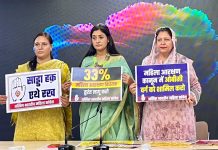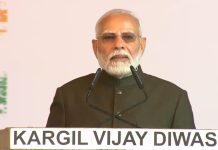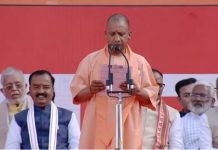
Peasant uprisings have a long chequered history and had been witnessed earlier in the feudal and semi-feudal societies. The most recent protests against the three farm laws have devolved into political bickering. Can anyone afford to alienate farmers, the most powerful constituency? A report by Mudit Mathur
The farmers agitation had gone to point of no return after they failed to sensitise Modi government to go on backfoot to repeal three farm legislations and mandating min
m support price for agriculture produces by enacting law. The farmers are continuing their peaceful protests on the peripheries of national capital for more than nine months and killing of one farmer and many injured in unprovoked Lathi-charge by Karnal police on them, added fuel to reignite their aggression. These events culminated further in aggressive confrontation ahead of assembly elections in five states including major stakes in most crucial Uttar Pradesh, Punjab and Uttarakhand.
The biggest ever Kisan Mahapanchayat convened by Samyukt Kisan Morcha (SKM) on 5th September at the Government Inter College ground in Muzaffarnagar in the western Uttar Pradesh, popularly known as Jat Land, witnessed a massive turnout of farmers, not just from UP, but also from adjoining states of Uttarakhand, Haryana Punjab and other states. Farmers’ Unions gave unanimous call to save nation by voting out BJP governments. SKM also called for a “Bharat Bandh” on September 27 in support of their demands––Repeal of three farm laws and enactment of law mandating MSP. The farmers have organised a Yatra on Gandhi Jayanti from Champaran (Bihar) that will culminate in Varanasi on 7th October.
The assembly polls in Uttar Pradesh are due in 2022. The venue of mahapanchayat in Muzaffarnagar seem to strategically chosen in view of its impeccable electoral impact in western UP may turn out to be state-wide huge, as Jats are a decisive factor and have a substantial impact on at least 125 out of the 403 seats in Uttar Pradesh.
“The farmers from the soil of western Uttar Pradesh gave uprising call for their rights pledging to vote out BJP rule in poll bound states, is being viewed as a serious political development aimed to hit the roots of BJP by rejecting politics of communal polarisation which may unsettle political equations in the region for the ruling party,” feel political analysts. In an aftermath of communal riots of Muzaffarnagar in 2013, the Prime Minister Narendra Modi launched his 2014 fiery election campaign from the deeply polarised soil of this region–– elevating him to power. Same trend continued in 2017 assembly elections and 2019 Lok Sabha polls but now ground realities appears to be fast changing with multiple issues concerning common man lives.
The speeches of farmers’ leaders at the mammoth rally actually reflect their mindset of anger against the prime minister Modi and his policies for the farm sector which they term––“Anti-farmer and pro corporates.” In order to mobilise support of farmers for their demands, these leaders will extensively tour to organise 17 such Mahapanchayats at the regional headquarters of the state including Gorakhpur and Varanasi, represented by CM Adityanath and PM Modi.
Prominent SKM leaders–– Dr Darshan Pal, Dr Ashok Dhawle, D.P. Singh and Tejinder Singh Virk of Punjab came to mobilise support of farmer unions for making successful their call of “Bharat Band” on 27 September. Their state level meeting held in Raidas Bhawan resolved to enlarge their reach by associating trade unions, women organisations, traders and transporters’ bodies and civil and human rights defenders. 85 local farmer organisations participated. The farmers would also boycott the products of Adani-Ambani and will liberate toll plazas from taxing the people.
Highlighting the plans of the government behind the three contentious legislations, the farmer’s leader Chaudhari Rakesh Tikait slammed the government for “selling the country to corporates” and said the mission of our Samyukt Kisan Morcha is not just confined to Uttar Pradesh and Uttarakhand as we are fighting bigger battle “to save the nation and the Constitution of India.” “This battle is on the shoulders of 140 million unemployed youths of our country and our children who were rendered unemployed,” he added.
Chaudhari Tikait blamed that BJP cheated the nation as their election manifesto (Sankalp Patra) it was nowhere disclosed that its government plan to sell out, our farm lands, Rail, Ports, Airports, Highways, Power, LIC, Banks, ONGC, BPCL, FCI warehouses and big corporate houses like Adani and Ambani are the buyers. “India is on Sale,” remarked Tikait, questioning who gave them permission? whose power is to sell national assets?
Tikait said the policies of privatisation are most dangerous as it will multiply unemployment problem and would lead to exploitation of employees under contractor’s regime. If Highways are privatised no poor man can put a tea stall across the roads. The fishermen and farmers of salt have been ruined due to privatisation of around 100 Km of port areas to Adani. “We fail to understand how the public assets are being sold to defaulter companies. Where the money is going?” he asked.
“BJP has betrayed cane farmers as it promised to enhance sugarcane price to Rs.450 per quintal but present government has not raised a single paisa while previous government raised Rs.80 and Rs.50 respectively. People of UP will not tolerate Shah, Modi and Yogi. Is Yogi government so weak that it cannot raise the price of crops by even one rupee?” said farmers leader, mentioning that if we ask recovery of our cane dues to the tune of more than Rs. 12000 crores from the sugar factories the government put blame on us of playing politics. “If asking payment of our outstanding sugarcane dues amount to doing politics, then we shall continue to play such politics,” he added.
He loudly recited “Allah hu Akbar Har-Har Mahadev,” the traditional slogan of Kisan Union symbolising communal harmony and brotherhood from the times of his father Mahendra Singh Tikait. Muzaffarnagar riots in 2013 deeply shattered Jat-Muslim unity, resultant in extraordinary saffron upsurge of BJP in 2014––2019 Lok Sabha and 2017 assembly elections.
Libelling Prime Minister Narendra Modi and other BJP leaders’ as “rioters”, Bhartiya Kisan Union leader (BKU) Chaudhari Rakesh Tikait alleged, “These people (BJP) have always worked to divide people and are responsible for riots. We will have to stop them. We will have to work constructively. We will not give our Uttar Pradesh in the hands of those outsiders responsible for riots.” “BJP rules on the basis of hatred and division and should be made to suffer electoral losses.” “Iss sarkar ko vote ki chot milni chahiye (This government should be ousted electorally),” he urged chanting slogan “Faslon ke daam nahin, to vote nahin (no fair price for crops, no votes).”

Chaudhari Tikait concluded his address with loudly chanting, “Allah hu Akbar Har-Har Mahadev,” and upon crowd reciprocally resounded with these chants, he composedly observed, “Mission UP has just begun from Muzaffarnagar and the number of people who have joined here will witness it.” Dubbing the BJP, a “divisive” party, Tikait trust that now people will choose love and unity.
The worst Hindu-Muslim riots engineered in 2013 wherein the horrible killings of 42 Muslims and 20 Hindus had broken traditional brotherhood ties among them but farmers agitation witnessed bridging the divide. Perhaps this under current may change poll dynamics of the state.
“We started our fight against the three black farm laws, the movement would have been killed on 28th January. There was a force of thousands and we were outnumbered, but we didn’t give up,” Tikait recalled his nightmare while addressing mammoth mahapanchayat.
“The prime minister promised to double the income of farmers by 2022. The protest is on for almost nine months now, but the government has stopped talking to us. They didn’t even pay tribute to the hundreds of farmers who died during our protest but we were branded as––Andolanjeevi,” said Tikait, adding that the UP government had not raised the price of sugarcane that has worsened the condition of farmers.
Explaining the demerits of three farm laws Rakesh Tikait in a conversation told the Tehelka, “Take the example of the flexible fare system of airline services who charge different fares for the same distance in the same flight for the same services. Need is the basis to extract profit from the consumers. On the same pattern, government enacted new farms laws to possess farm produces for trade under corporate control that may extract profit from our hunger. The hungriest would have to shell out more money than less hungry,” “So we don’t need such laws designed to create discrimination among the masses and violates equality in the society,” Tikait reiterated.

Chaudhari Tikait, an ancestor of Muzaffarnagar, had taken a pledge soon after police crackdown on peacefully demonstrating unarmed farmers on the UP-Delhi boarders of removing their Dharna for alleged violence unleashed on the occasion of Republic Day at Red Fort, that he will not return home unless these three farm laws are withdrawn. Heavy police force came to dislodge them from Ghazipur border on 28 January but the tears of hapless farmers’ leader Chaudhari Tikait resurrected their fading movement with unimaginable strength with a fresh lease of life.
Sponsored media campaigns could not break the farmers’ unity after the exposures of credentials of troublemakers and the role of many media houses that stood exposed by independent journalists through social media platforms. Living to his pledge, Tikait left without visiting his house in the city, merely a kilometre away from the mahapanchayat site.
Rejecting the appeal of Prime Minister Narendra Modi, the farmers continued escalating momentum to their agitation for repeal of all the three laws terming it a people’s revolution against “traders of hunger” affecting everybody of the country. the decision to continue peaceful round the clock demonstration of peripheral routes approaching national capital has been going on for the last nine months as central government did not pay any heed to their demands of repeal of three laws and enactment of legislation for guaranteed minimum support price (MSP) of farm and dairy produce.
“Fasal hamari daam tumhara nahin chalega, Desh hamara kabza tumhara nahi chalega (Our crops, your rates? Our country, your control? We will not accept it),” said one of the leaders of farmers from the dais.
Mahapanchayat was also addressed by noted human rights defender Medha Patkar, Balbir Singh Rajewal, president of BKU (Rajewal), and leader of SKM Yogendra Yadav. Rakesh Tikait welcomed the guest speakers on the dais by putting on yellow stoles.
“For the last 100 days, government people were saying that the protest was losing steam. This ground, this city is not able to accommodate everyone, such is the scale of gathering. Farmers had debt worth crores in UP,” SKM Yogendra Yadav said seeing overwhelming crowds. “This is the same Muzaffarnagar where rivers of blood were drawn between Hindus and Muslims. They played politics with burning houses. Someone who makes communities fight cannot be the true son of the nation,” he added.
“The price of sugarcane has not been increased. Instead of giving fair prices for crops, the UP government is fooling the farmers. They said we will buy each food crop grain. Modi government said we will get crop insurance. The govt benefitted of Rs 2,500 crore in the name of insurance. It is farmers’ money,” Yadav remarked.
Balbir Singh Rajewal, president of BKU (Rajewal), also slammed the government saying it was only fulfilling “corporate interests.” “This has become a government by the people for the corporates. Politicians get elected so that policies and laws are made for corporates to live comfortably. The farmers have been hurt by the remarks made against them. They were never been abused and humiliated so much before. They will never forgive BJP,” Rajewal asserted. A woman farmer leader from Karnataka addressed the gathering in Kannada.
BKU media in-charge Dharmendra Malik said farmers belonging to 300 organisations spread across different states like Uttar Pradesh, Haryana, Punjab, Maharashtra, Karnataka, among others, have gathered for the event. He said over 5,000 ‘langars’ (food stalls), including some mobile stalls, have been set up for the participants.
The farmers, including women carrying flags of different organisations and wearing different coloured caps, were seen arriving at the venue in buses, cars and tractors. Surprisingly defying party lines, the BJP MP Varun Gandhi in his tweet, described the protesting farmers as “our own flesh and blood” and suggested that the government should re-engage with them in reaching common ground.
The Supreme Court of India had come forward to salvage the warring situation between steadily struggling farmers and an equally adamant central government from the point of no returns. The apex court suspended the operation and implementation of the three farm laws until further orders. Meanwhile the court appointed committee had submitted its report to apex court five months back which was formed to consult farmers and other stakeholders.
However, the agitating farmers had declined to participate in the proceedings of the committee and continued unrelentingly ahead with their pre-declared plans demanding repeal of all the three farm laws––’Farmers’ Produce Trade and Commerce (Promotion and Facilitation) Act, 2020,’ Farmers (Empowerment and Protection) Agreement of Price Assurance and Farm Services Act, 2020’ and Essential Commodities (Amendment) Act, 2020. The same stand they reiterated before the government resulting in breakdown of talks since 22 January, 2021.
The farmers struggle for fair prices and timely payment of their produce has been continuing since long and suffered huge losses during lockdown period when they helplessly saw their perishable produce got rotten in the field. The floriculture suffered huge losses. Milk producers complain that they compelled to sell milk at much lesser price than water bottles. They plead for legislative protection of all their farm produce through guarantee of minimum support price (MSP).
The ongoing farmers belligerent movement indicates changing dynamics of political forces as BJP rose to overwhelming power after Rakesh Tikait supported the party in the last Lok Sabha and Vidhan Sabha elections.
The call of truth is echoing: Rahul
Supporting the protesters, the congress leader Rahul Gandhi tweeted in Hindi, “The call of truth is echoing. You have to listen, unjust government!”
Congress general secretary Priyanka Gandhi Vadra remarked that “arrogance of power” cannot withstand the roar of the farmers. “Farmers are the voice of this country. Farmers are the pride of the country. Arrogance of any power cannot withstand the roar of the farmers,” she retorted. “The whole country is with the farmers in the fight to save agriculture and in demanding their dues for their hard work,” she said.
Congress chief spokesperson Randeep Surjewala said those stealing the farms of farmers are traitors.
Meanwhile, Rajasthan Chief Minister Ashok Gehlot and his bête noire Sachin Pilot hit out at the BJP government over the controversial farm laws, saying when the time comes the farmers of the country won’t delay in teaching a lesson to the saffron party.
Gehlot said the farmers have fully understood the BJP’s “false promise” of doubling their income by 2022 and attempts to hand over agriculture to big businessmen by imposing anti-farmer agriculture laws without taking the farmers into confidence.
Congress leader Sachin Pilot expressed confidence that the mahapanchayat organised under the leadership of the Samyukt Kisan Morcha will strengthen farmers’ interests. “May this mahapanchayat prove to be a milestone in the direction of a peaceful farmers’ movement,” Pilot said in a tweet in Hindi.
Reacting on the success of farmers mahapanchayat the Samajwadi Party chief Akhilesh Yadav called unprecedented solidarity of farmers in western UP on one side and teachers and general public in eastern UP on the other has shown that the oppressive, divisive, arrogant BJP will never return to power. This is a wave of public opinion against the havoc of BJP. BJP is over!
Mahapanchayat A Poll Meeting, says BJP
The BJP accused the organisers of the event of indulging in politics, with assembly polls approaching. Terming the event as an “election meeting” ahead of Assembly polls due in a number of states, including Uttar Pradesh next year.
The BJP’s ‘Kisan Morcha’ head and MP Rajkumar Chahar alleged in a statement that it is politics and not concerns for farmers which have been on the agenda of those behind the ‘mahapanchayat.’
“This was very much like a political and election meeting. The Opposition and these farmer union leaders have been using the shoulders of farmers to engage in politics,” he said.
Chahar claimed that no government has done so much for farmers as the one led by Prime Minister Narendra Modi in the past seven years.
However, defying the government’s stand, the BJP MP Varun Gandhi, described the farmers’ protests as “our own flesh and blood” and suggesting that the government re-engage with them. Varun won appreciation across his party forum and Rashtriya Lok Dal leader Jayant Chaudhary praised his gesture.
Apex Court efforts failed to bear fruit
The apex court had suspended until further orders the implementation of the three controversial farm laws–– ‘Farmers’ Produce Trade and Commerce (Promotion and Facilitation) Act, 2020,’ Farmers (Empowerment and Protection) Agreement of Price Assurance and Farm Services Act, 2020’ and Essential Commodities (Amendment) Act, 2020 and constituting a committee to consult farmers and other interested persons.
The committee included farm-economist Ashok Gulati, Bhupinder Singh Mann, President BKU and All India Coordination Committee, Pramod Kumar Joshi (Director South Asia international Food Policy) and Anil Ghanwat (Shethkari Sangathan) as its members but one of its members Bhupendra Singh Maan opted to be out of it.
The protesting farmers unions had explicitly expressed their disinclination to participate in the negotiation talks before a committee proposed by the top court as they were not ready to accept anything less than repeal of three enactments.
‘Samyuktha Kisan Morcha,’ the representative body of all the farmers unions, declined to participate in talks before the committee would be futile in view of the consistent and unyielding attitude taken by the central government before the Court that it will not repeal the three farm laws. Even after the clear indication of staying, the implementation of farm laws from apex court the central government made it repeatedly clear that it would not agree to any discussion on the repeal of farm laws. Therefore, scope of talks could not be there.
The farmer unions reiterated that they will not participate in any court-ordered committee process and they would not call off their protest until the newly enacted legislations are repealed. “It is clear that the court is being misguided by various forces even in its constitution of a committee. These are people who are known for their support to the three enactments and have actively advocated for the same,” said Dr. Darshan Pal of All India Kisan Sangharsh Coordination Committee (AIKSCC).
Balbir Singh Rajewal said, “Unfortunately, the image of the Supreme Court is such that people have lost their confidence in the judiciary. The way the former Chief Justice of India accepted the Rajya Sabha seat completely destroyed whatever was even left. Otherwise, if the Supreme Court had taken suo moto notice then these Acts wouldn’t have lasted for even two days.
It is worth mentioning that the constitutional validity of the three controversial farm laws was under challenge before the Supreme Court in various public interest litigation praying to struck down such legislations enacted in violation of settled constitutional norms and exceeding its legislative competence of parliament and overreaching the subject of states’ domain violating federal structure.
Constitutional law expert Senior Advocate Mohan Katarki argues, “Agriculture is a state subject. However, it seems the Centre is banking on Entry 33 of List III. But this entry which talks of “Trade and commerce in …” doesn’t include “Markets” namely trading places or platforms. “Markets” is specifically mentioned as a state subject in entry 28 of List II. Therefore, the Farmers Produce Trade and Commerce Act is clearly outside the competence of Parliament.”
The governments of Punjab, Chhattisgarh and Rajasthan have drafted their own Farm Bills to amend the central legislation. Many have also criticised the state amendments for not addressing the issues of MSP and other concerns of the farmers. Notably, Rajasthan’s bills have been put on hold by the Governor. “The amendments passed by the states are prima facie legal in my view. They derive this power from the State list,” viewed Katarki.
I am not in favour of withdrawal of farm laws, says Ghanwat Shetkari Sanghatana president, Anil J Ghanwat, one of the panel members, had written to the Chief Justice of India urging him to make the report public. “The committee does not support repeal of the three laws, as being demanded by protesting farmers, but he and his organisation certainly believed that there are “many defects” in the laws that needed to be addressed,” he pointed out.
Urging an urgent hearing on the three contentious farm-laws Ghanwat claimed in a letter addressed to Chief Justice of India that the report submitted by the committee is “cent per cent” in favour of farmers and the apex court must take up the matter without any further delay.
Ghanwat admitted that the government and the Supreme Court have to consider the law-and-order issue that may arise with the release of the report for which they needed to take time, but “they just cannot dump it and they should not dump it.” “It is therefore very important for the apex court to release the report in the public domain at the earliest to clear all apprehensions of farmers,” Ghanwat emphasised.
“It’s been five months since we have submitted our report to the court and I can’t understand what could be the reasons for the court to not taking cognizance of the report,” he added demanding the court to release the report at the earliest.
In his letter to the CJI, Ghanwat had underlined, “The report has addressed all apprehensions of the farmers. The committee was confident that the recommendations will pave the way to resolve the ongoing farmers’ agitation.” “As a member of the committee, representing the farmers’ community, I am pained that the issue raised by the farmers aren’t resolved and the agitation is continuing. I feel that the report has not been given any attention by the apex Court,” Ghanwat wrote in his letter.
Ghanwat also condemned the lathicharge on protesting farmers in Karnal, Haryana and said, “It should not have happened. Their demand may not be right, but they have the right to air their views and protest.”
While suspending the implementation of the three farm laws, the Supreme Court had constituted a Committee on January 12, 2021, to which Ghanwat was nominated as a member to represent the farming community. Other members of the committee are Ashok Gulati, former chairman of the Commission for Agricultural Costs and Prices (CACP) and Pramod Kumar Joshi from the International Food Policy Research Institute.
tehelkaletters@gmail.com











